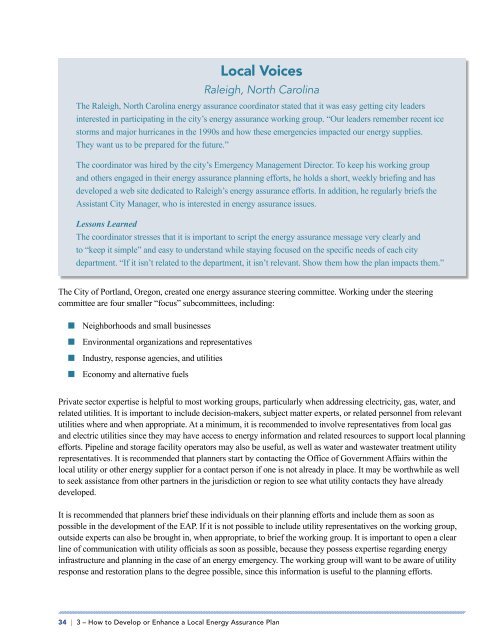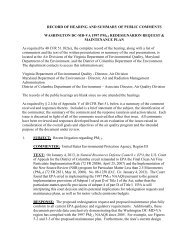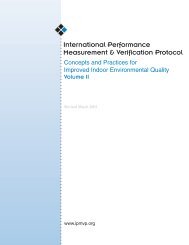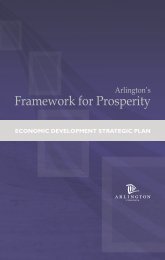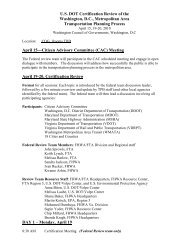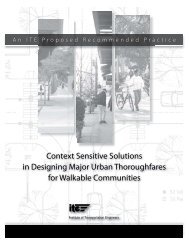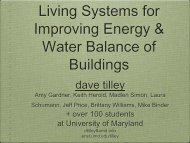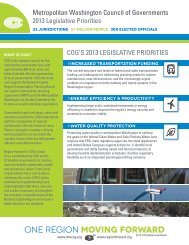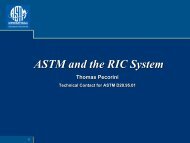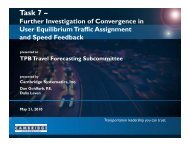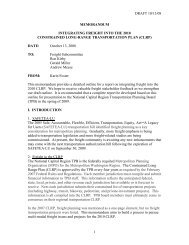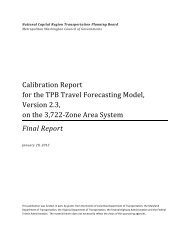PTI Local Government Energy Assurance Guidelines - Metropolitan ...
PTI Local Government Energy Assurance Guidelines - Metropolitan ...
PTI Local Government Energy Assurance Guidelines - Metropolitan ...
Create successful ePaper yourself
Turn your PDF publications into a flip-book with our unique Google optimized e-Paper software.
<strong>Local</strong> Voices<br />
Raleigh, North Carolina<br />
The Raleigh, North Carolina energy assurance coordinator stated that it was easy getting city leaders<br />
interested in participating in the city’s energy assurance working group. “Our leaders remember recent ice<br />
storms and major hurricanes in the 1990s and how these emergencies impacted our energy supplies.<br />
They want us to be prepared for the future.”<br />
The coordinator was hired by the city’s Emergency Management Director. To keep his working group<br />
and others engaged in their energy assurance planning efforts, he holds a short, weekly briefing and has<br />
developed a web site dedicated to Raleigh’s energy assurance efforts. In addition, he regularly briefs the<br />
Assistant City Manager, who is interested in energy assurance issues.<br />
Lessons Learned<br />
The coordinator stresses that it is important to script the energy assurance message very clearly and<br />
to “keep it simple” and easy to understand while staying focused on the specific needs of each city<br />
department. “If it isn’t related to the department, it isn’t relevant. Show them how the plan impacts them.”<br />
The City of Portland, Oregon, created one energy assurance steering committee. Working under the steering<br />
committee are four smaller “focus” subcommittees, including:<br />
■■<br />
■■<br />
■■<br />
■■<br />
Neighborhoods and small businesses<br />
Environmental organizations and representatives<br />
Industry, response agencies, and utilities<br />
Economy and alternative fuels<br />
Private sector expertise is helpful to most working groups, particularly when addressing electricity, gas, water, and<br />
related utilities. It is important to include decision-makers, subject matter experts, or related personnel from relevant<br />
utilities where and when appropriate. At a minimum, it is recommended to involve representatives from local gas<br />
and electric utilities since they may have access to energy information and related resources to support local planning<br />
efforts. Pipeline and storage facility operators may also be useful, as well as water and wastewater treatment utility<br />
representatives. It is recommended that planners start by contacting the Office of <strong>Government</strong> Affairs within the<br />
local utility or other energy supplier for a contact person if one is not already in place. It may be worthwhile as well<br />
to seek assistance from other partners in the jurisdiction or region to see what utility contacts they have already<br />
developed.<br />
It is recommended that planners brief these individuals on their planning efforts and include them as soon as<br />
possible in the development of the EAP. If it is not possible to include utility representatives on the working group,<br />
outside experts can also be brought in, when appropriate, to brief the working group. It is important to open a clear<br />
line of communication with utility officials as soon as possible, because they possess expertise regarding energy<br />
infrastructure and planning in the case of an energy emergency. The working group will want to be aware of utility<br />
response and restoration plans to the degree possible, since this information is useful to the planning efforts.<br />
34 | 3 – How to Develop or Enhance a <strong>Local</strong> <strong>Energy</strong> <strong>Assurance</strong> Plan


